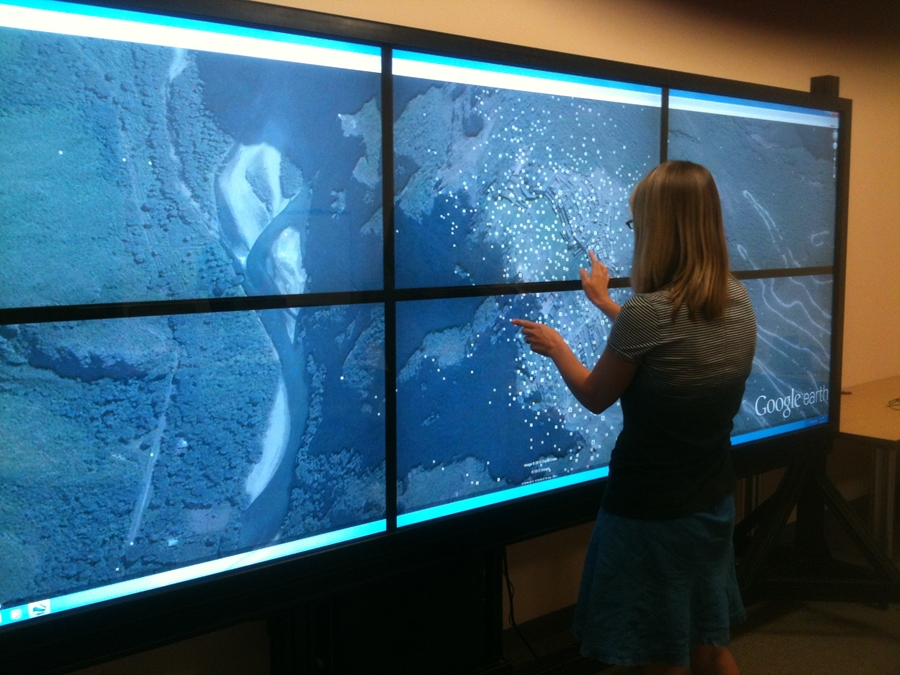
FAYETTEVILLE, Ark. – The Center for Advanced Spatial Technologies at the University of Arkansas will lead a statewide effort to integrate industry-specific geospatial technology skills into existing degree and certificate programs at community colleges in rural areas.
The National Science Foundation, through its Advanced Technical Education program, awarded CAST a three-year grant for $898,073 for the Opening Pathways to Employment through Nontraditional Geospatial Applications in Technical Education, which will be known by the acronym OPEN-GATE.
Geospatial technologies include computer-based mapping and data acquisition and analysis using geographic information systems. The U.S. Department of Labor has listed it as a high-growth industry and a major area of job creation in the next decade. A recent survey found a need for technicians, especially those who can store, create and manage data.
The program’s goals are to increase use of geospatial technology statewide, expand access to geospatial education and training and improve existing employee skills while expanding the workforce.
“This provides an opportunity to seed a larger number of programs around the state in a way that reflects the way GIS and geospatial technologies in general are being used,” said CAST Director Jackson Cothren.
CAST will work with four community colleges in the University of Arkansas System to include geospatial technology curriculum in current programs. They are:
- Cossatot Community College of the University of Arkansas in De Queen
- Phillips Community College of the University of Arkansas in Helena-West Helena
- University of Arkansas Community College at Batesville
- University of Arkansas Community College at Morrilton
Each participating community college will work with local industry to create an Employer Advisory Board to provide feedback about employer needs for the developing workforce and facilitate direct interaction between employers, faculty and students.
“We can build an accessible educational ladder for a local, technologically skilled workforce to meet the developing needs of industry in Arkansas,” Cothren said.
“If this program is successful, we’d like it to expand to other community colleges in the state,” said Robyn Lane, a GIS education specialist at CAST who will lead the program. “We would also like this to expand into a regional center that could provide support in neighboring states.”
About the Center for Advanced Spatial Technologies: CAST, established in the J. William Fulbright College of Arts and Sciences in 1991, is dedicated to research and applications in geospatial analysis and modeling, remote sensing and digital photogrammetry. Remote sensing is the measurement or acquisition of information about an object without direct contact, such as by satellite imaging, radar or aerial photography. Photogrammetry is the science of recording, measuring and interpreting photographic images or other two-dimensional, remotely sensed data.
About the University of Arkansas: The University of Arkansas provides an internationally competitive education for undergraduate and graduate students in more than 200 academic programs. The university contributes new knowledge, economic development, basic and applied research, and creative activity while also providing service to academic and professional disciplines. The Carnegie Foundation classifies the University of Arkansas among only 2 percent of universities in America that have the highest level of research activity. U.S. News & World Report ranks the University of Arkansas among its top American public research universities. Founded in 1871, the University of Arkansas comprises 10 colleges and schools and maintains a low student-to-faculty ratio that promotes personal attention and close mentoring.
Topics
Contacts
Jackson Cothren, director, CAST
J. William Fulbright College of Arts and Sciences
479-575-5421, jcothre@uark.edu
Robyn Lane, GIS education specialist, CAST
J. William Fulbright College of Arts and Sciences
479-575-5639, rjlane@uark.edu